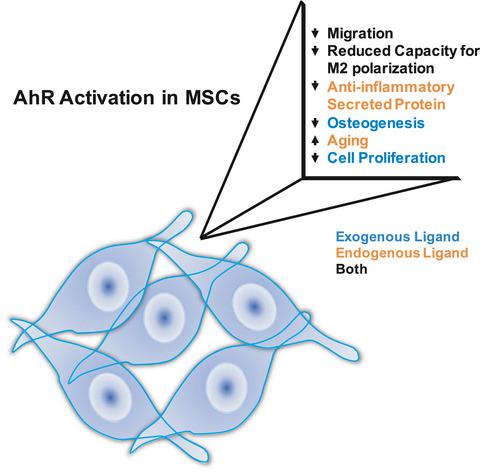Our official English website, www.x-mol.net, welcomes your feedback! (Note: you will need to create a separate account there.)
Aryl hydrocarbon receptor in mesenchymal stromal cells: new frontiers in AhR biology
The FEBS Journal ( IF 5.4 ) Pub Date : 2020-10-16 , DOI: 10.1111/febs.15599 Kristopher K Abney 1 , Jacques Galipeau 1
The FEBS Journal ( IF 5.4 ) Pub Date : 2020-10-16 , DOI: 10.1111/febs.15599 Kristopher K Abney 1 , Jacques Galipeau 1
Affiliation

|
Mesenchymal stromal cells (MSCs) are nonhematopoietic cells that have been clinically explored as investigational cellular therapeutics for tissue injury regeneration and immune-mediated diseases. Their pharmaceutical properties arise from activation of endogenous receptors and transcription factors leading to a paracrine effect which mirror the biology of progenitors from which they arise. The aryl hydrocarbon receptor (AhR) is a transcription factor that has been extensively studied as an environmental sensor for xenobiotics, but recent findings suggest it can modulate immunological functions. Both genetic and pharmacological investigations revealed that MSCs express AhR and that it plays roles in inflammation, immunomodulation, and mesodermal plasticity of endogenous MSCs. Further, AhR has been shown to interact with key signaling cascades associated with these conditions. Therefore, AhR has potential to be an attractive target in both endogenous and culture-adapted MSCs for novel therapeutics to treat inflammation and other age-related disorders.
中文翻译:

间充质基质细胞中的芳烃受体:AhR 生物学的新前沿
间充质基质细胞 (MSC) 是非造血细胞,已在临床上作为研究性细胞疗法用于组织损伤再生和免疫介导疾病的研究。它们的药物特性源于内源性受体和转录因子的激活,导致旁分泌效应,这反映了它们产生的祖细胞的生物学特性。芳烃受体 (AhR) 是一种转录因子,作为异生物质的环境传感器已被广泛研究,但最近的研究结果表明它可以调节免疫功能。遗传学和药理学研究表明,MSCs 表达 AhR,并且它在内源性 MSCs 的炎症、免疫调节和中胚层可塑性中发挥作用。更远,AhR 已被证明与与这些条件相关的关键信号级联相互作用。因此,AhR 有可能成为内源性和适应培养的 MSC 的有吸引力的靶标,用于治疗炎症和其他与年龄相关的疾病的新疗法。
更新日期:2020-10-16
中文翻译:

间充质基质细胞中的芳烃受体:AhR 生物学的新前沿
间充质基质细胞 (MSC) 是非造血细胞,已在临床上作为研究性细胞疗法用于组织损伤再生和免疫介导疾病的研究。它们的药物特性源于内源性受体和转录因子的激活,导致旁分泌效应,这反映了它们产生的祖细胞的生物学特性。芳烃受体 (AhR) 是一种转录因子,作为异生物质的环境传感器已被广泛研究,但最近的研究结果表明它可以调节免疫功能。遗传学和药理学研究表明,MSCs 表达 AhR,并且它在内源性 MSCs 的炎症、免疫调节和中胚层可塑性中发挥作用。更远,AhR 已被证明与与这些条件相关的关键信号级联相互作用。因此,AhR 有可能成为内源性和适应培养的 MSC 的有吸引力的靶标,用于治疗炎症和其他与年龄相关的疾病的新疗法。

























 京公网安备 11010802027423号
京公网安备 11010802027423号